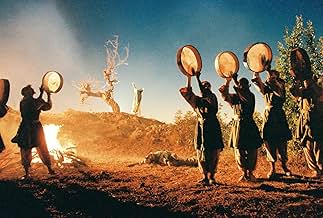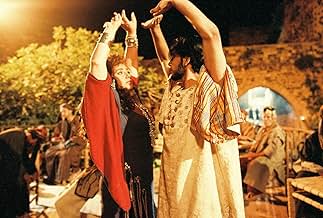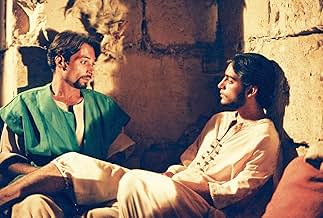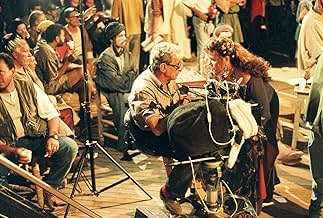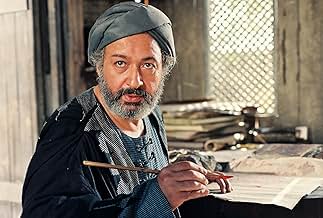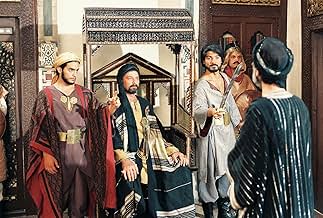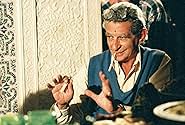Adicionar um enredo no seu idiomaThe story is set in the 12th century in Arab-ruled Spanish province Andalusia, where famed philosopher Averroes is appointed grand judge by the caliph and his liberal court judgments are not... Ler tudoThe story is set in the 12th century in Arab-ruled Spanish province Andalusia, where famed philosopher Averroes is appointed grand judge by the caliph and his liberal court judgments are not liked by everyone. The caliph's political rivals, centered around the leader of a fanatic... Ler tudoThe story is set in the 12th century in Arab-ruled Spanish province Andalusia, where famed philosopher Averroes is appointed grand judge by the caliph and his liberal court judgments are not liked by everyone. The caliph's political rivals, centered around the leader of a fanatical Islamic sect, force the caliph to send Averroes into exile, but his ideas keep on livin... Ler tudo
- Direção
- Roteiristas
- Artistas
- Prêmios
- 2 vitórias e 1 indicação no total
- Averroes
- (as Nour El Cherif)
- Al Mansour, The Caliph
- (as Mahmoud Hemeida)
- Averroes' Wife
- (as Safia El Emary)
- Nasser, The Crown Prince
- (as Khaled El Nabaoui)
- The Caliph's Brother
- (as Seif Abdel Rahman)
- Emir of the Sect
- (as Magdi Idris)
- Gaafar
- (as Hasan El-Adl)
- Direção
- Roteiristas
- Elenco e equipe completos
- Produção, bilheteria e muito mais no IMDbPro
Avaliações em destaque
The movie has one of the grimmest beginnings I've ever seen. It never gets quite that grim again, but the first few minutes are hard to sit through.
After that, the story is interesting, if hard to understand. The philosopher Averroes was a historical figure. He sometimes lived in North Africa, and sometimes in Andalusia. (Nour El-Sherif is an excellent actor, and he makes us believe in Averroes as a real human being, and not just as a philosopher on a pedestal.)
Averroes translated the works of Aristotle into Arabic, and then he wrote commentaries about them. It's possible that these works would have been lost if Averroes had not undertaken this immense intellectual task.
The basic plot of the story circles around the interaction of Averroes with the Caliph, and the Caliph's brother and sons. I have to admit that I got the sense of who was doing what to whom, but I couldn't always understand the details.
This movie is worth seeing because it's colorful, well-acted, and shows us events about which many of us know very little. It has a solid IMDb rating of 7.3, and I recommend it. It will work better on the large screen.
We were able to see it at Rochester's wonderful Dryden Theatre where it was shown--free--as part of a series entitled Salam. The series is being presented to commemorate the lives of the victims of the atrocities at the Al Noor Mosque and the Linwood Islamic Centre in New Zealand, and in solidarity with Muslim people.
The series was organized by the Eastman Museum in partnership with the Islamic Center of Rochester. I commend both institutions for using artistic works to combat and decry hatred.
The film had a great deal of technique and style. Although the film is set in the past, the language of the script is in colloquial Arabic, which is spoken on the streets of Egypt at this point in time. Making delivering the content of the words more important than giving the audience a believable setting. Aside from being a historical representation it was a philosophical thought on religion, society and politics. Some of the obvious themes in the film were as follows. The freedom of thought expressed in the power of the written and spoken word as a form of representation of the people, what they stand for, and their sufferings. In addition to the self and social destruction caused by ones political motivation hidden behind a religious façade.
Finally the film brings great memory of Francois Truffaut's `Fahrenheit 451'-. In making the point that one can burn all the books in the world, but that would never take what is in the books away from the people, because true words, weather written or memorized, are humanities memory and being till the end of time. Both films complement each other, one can darlingly view, `Al-Massir' as the beginning of a time that was elaborately explored in `Fahrenheit 451.' Both films had the same ending, in which the books were burnt and the words were kept in the memory of the people, independent of what the present political power did. The words of scholars, philosophers and story tellers live forever.
The story is set in medieval Moorish Spain, about the conflict between Averroes; a historical humanistic Muslim philosopher; and a group of reactionary fundamentalists. It is very well acted and the characters are sympathetic as well as credible. Often forgotten is that many of the Islamic societies of the Early Middle Ages (particularly in Spain) were ahead of Europe in science, mathematics, medicine, religious tolerance and many intellectual pursuits. But, there were periodic and sometimes serious conflicts with those who resented these trends.
This is not just an historical epic. The Egyptian director, a very courageous man named Youssef Chanine, deliberately molded the script to show how fanaticism undermines not only a society's intellect, but destroys it's soul. Particularly disturbing, but highly relevant to our times, is showing the subtle manner in which young men are recruited into these movements and about how empty and dishonest they turn out to be.
Although the population of medieval Andalusia was 10-15% Jewish and Averroes had extensive contact with both Jewish and Christian intellectuals, there isn't a Jew in sight and the only Christians are depicted as evil, fanatical, external enemies who enter into a secret pact with the fundamentalist cult. While this is not entirely accurate and a gross simplification of the actual situation at the time, I don't fault Mr. Chanine. He has endured extreme legal harassment in the Egyptian courts over this and another film as well as extensive death threats against himself and his family. Merely exploring the themes portrayed in this movie has put his head on the chopping block, and any sympathetic depiction of Jews or Christians would have resulted in the banning of the film and possibly his head rolling into the basket. He deliberately crafted this film to educate his own society about the debasement and moral corruption wrought by cultism and violence, and, no doubt, wanted to make sure the message got out.
A bold, and gently provocative film by a very brave man.
Você sabia?
- CuriosidadesAccording to an interview actor Nour El-Sherif stated that the role of Ibn Roshd was supposed to be played by director Youssef Chahine himself, but Nour told him that he was not suitable for the role.
- Citações
Caliph's brother: Thoughts have wings. No one can prevent them from flying.
- ConexõesFeatured in Humbert Balsan, producteur rebelle (2006)
- Trilhas sonorasAlli sotak
and "Gamr el Hawa", words by Sameh El Kodoussi and Kawssar Mostapha, music by Kamal El Tawil
Performed by Mohamed Mounir
Principais escolhas
- How long is Destiny?Fornecido pela Alexa
Detalhes
- Data de lançamento
- Países de origem
- Idiomas
- Também conhecido como
- Destiny
- Locações de filme
- Krak des Chevaliers, Syria(sect training grounds)
- Empresas de produção
- Consulte mais créditos da empresa na IMDbPro

